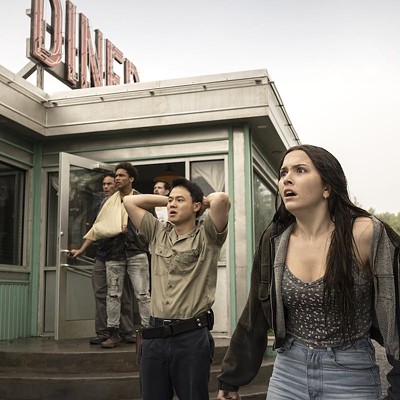Serenity risks being slighted as a big-screen TV episode. It’s a continuation of 2002 space-western series Firefly, which was shelved early in its run by the Fox network. Firefly gained a cult following on DVD, and the film attempts to give those fans some closure. Serenity is consistent with the series tone, but it’s a strong movie in its own right. The creator Joss Whedon (Buffy the Vampire Slayer) has always had solid cinematic ideas in his TV work. This a natural transition. The crew of the mercenary ship Serenity has taken on board a mysterious telepathic teen named River (Summer Glau). She’s being hunted by the evil, galactic empire, The Alliance. There’s enough exposition to make the movie basically comprehensible to anyone, although a prior attachment to the characters is helpful for the emotional payoffs. Whedon’s writing is such that there’s defined and distinctive personality behind every spoken line. Serenity is character-driven adventure as Hollywood rarely delivers. It also has a shocking ability to switch from comedy to tragedy without a moment’s notice. Whedon’s detractors point to his patented irony as a crutch but it’s an approach that harbours sincerity—in Serenity’s final scenes it reaches real poignance. This is about on par with the best Star Trek movies.
Into the Blue
Into the Blue is cinema haven for fans of PG-13-rated butt shots. But the movie is only sometimes honest about being an exploitation film. The rest of it strives for the toothless, middle-of-the-road esteem of director John Stockwell’s other youth dramas Blue Crush and crazy/beautiful. The first and last quarters have a shameless charge. Ridiculous boat stunts, misplaced pop music and insane violence highlight this remake of the 1977 hit The Deep. When two diving couples (played by Paul Walker and Jessica Alba, Scott Caan and Ashley Scott) find a sunken plane holding a fortune in cocaine, they’re made pawns to the real drug dealers. Walker and Caan worry that their girlfriends will leave them because they have no money. But it’s a conversation that leads nowhere; the female characters never voice those concerns. Class divide remains a faux pas subject in escapist films — all that can be said on the matter is that it’s awesome when the heroes arbitrarily get rich at the end of the movie. Alba is a limited actor, but her photogenic personality is enough to hold a film. Walker, on the other hand, is forced to act too much. The problem is the stars aren’t in on the fun. Into the Blue is only a trashy thrill half the time. The remainder is routine and sluggish, despite some stunning underwater photography. Oliver Twist
There’s something sad about a once risk-taking director adapting a property as beloved as Oliver Twist and trying only to make it respectable. Roman Polanski’s version of Charles Dickens’ classic takes a dramatic distance from the material that doesn’t attain outsider insight. It’s just boring. Like a Masterpiece Theatre episode, Oliver Twist wants only to do justice to its source. By squeezing in as many of the text’s events as possible, Polanski leaves no room for buildup, reflection or feeling. Without them, the almost two-and-a-half hours are very slow going. This is surprising as, like Oliver (Barney Clark), Polanski was himself an orphan after he escaped the Krakow ghetto at age 10. Where the movie should hurt with an establishment built on dehumanization, it’s stagy and inert. Polanski takes neither a child’s eye understanding or grown-up indignation to the subject matter. Though there’s authenticity in London’s grimy art direction and the interior shots are lit with the dimensional look of 19th-century painting, the conventional camerawork and inattention to rhythm bespeaks a highbrow laziness. The director of Repulsion, The Tenant and Chinatown has given in to the accolades that come with making lifeless prestige projects.
Full of life: [email protected].












